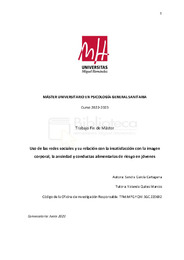Resumen :
Actualmente existe una preocupación notable por la influencia que las redes sociales tienen en jóvenes. Por ello, el objetivo de este estudio es analizar la relación entre conductas alimentarias de riesgo, insatisfacción corporal y ansiedad con el uso de redes sociales. Se contó con una muestra de ... Ver más
Currently there is a notable concern about the influence that social media has on young people. Therefore, the objective of this study is to analyze the relationship between risky eating behaviors, body dissatisfaction, and anxiety with the use of social media. A sample of 144 participants was included, with 53 being males (36.8%) and 91 being females (63.2%), with a mean age of 23 years (SD=3.15). The study employed the Eating Attitudes Test (EAT-26), Body Shape Questionnaire (BSQ), State-Trait Anxiety Inventory (STAI), Social Media Addiction Test (TARS), and two ad-hoc questionnaires for sociodemographic data and information about the type of social media platforms used, frequency, and types of content. The results obtained show a higher frequency of use among young people for WhatsApp, Instagram, TikTok, and YouTube. Relationship analyses showed that risky eating behaviors, body image concerns, state anxiety, and social media addiction were positively and significantly related in girls, but not in boys. Additionally, both boys and girls who were more concerned about their body image reported feeling bad when exposed to accounts showcasing "perfect" bodies and tended to compare their own bodies to those of others. Therefore, it is important to consider the relationship between social media and the emergence of body image dissatisfaction, symptoms related to eating disorders, and anxiety in young people.
|
 La licencia se describe como: Atribución-NonComercial-NoDerivada 4.0 Internacional.
La licencia se describe como: Atribución-NonComercial-NoDerivada 4.0 Internacional.
.png)
